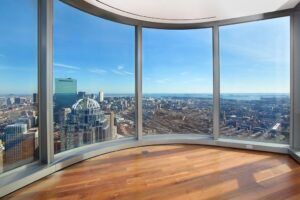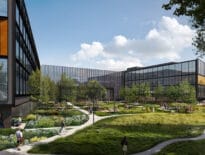
The view from a top-floor unit in the One Dalton luxury tower. High-end units in Boston’s core neighborhoods are sitting on the market longer, and in some cases taking price cuts. Photo courtesy of Campion & Co.
Maybe the rich are losing some of their taste for disembodied, high-altitude city living. Perhaps there has been a waning of interest in part of wealthy overseas buyers in downtown Boston’s gleaming array of new condominium towers.
Likely it’s a bit of both, and some other things as well.
These are some of the questions that come to mind after looking at the latest Warren Group stats on the downtown Boston condo market.
Prices in pricey neighborhoods with an array of new towers, from the Back Bay through the Financial District and down into the Seaport, plunged nearly 11 percent during the first eight months of 2021 compared the same period last year.
Durable Demand in Humble ’Hoods
And at least from my perch among the cheap seats here, the profusion of new luxury condo towers crowding Boston’s skyline has become increasingly wearisome.
From Mandarin Oriental, which debuted in the Back Bay in 2008, to the opening of the 60-story One Dalton tower two years ago, each new gold-plated tower has scrambled to up the ante in its claims as the final word in luxury living.
Ho-hum.
One of the big attractions of living in a city like Boston, as opposed to a suburb, is the vast and diverse tapestry of urban life and of the people who the make the city what it is.
But life in one of Boston’s posh uber-luxury residential towers is the very opposite of that. You are surrounded other very rich people who can afford to shell out millions, and in some cases tens of millions, for a condo with lavish amenities, from private dining clubs and private chefs to private theaters and private yoga and Pilates studios designed so you don’t have to step outside your gilded perch in the clouds.
As One Dalton’s website puts it, it’s “A service-rich lifestyle,” though the emphasis should surely be on the rich part of the equation here.
By contrast, condo prices in Boston’s more humble neighborhoods like Dorchester and West Roxbury are going through the roof, so there’s clearly a desire for city living, just of a different kind.
Dorchester’s median condo sale price shot up more than 11 percent year to date, to $569,000, while East Boston surged 13 percent gain to $630,000, Warren Group stats show.
Jamaica Plain condo prices are up nearly 3 percent to $670,000, Roslindale’s median has jumped nearly 21 percent $553,000, while West Roxbury has posted a hefty 18.7 percent gain, rising to 855.
Condo prices in more low-rise, human-scale Cambridge, Somerville have also proven more resilient than downtown Boston. Cambridge’s median condo price rose 4 percent to $815,000, while Somerville edged up 0.8 percent to $796,000, according to the Warren Group.
Time on Market, Supply Up
There’s another possible headwind facing the downtown Boston condo market as well, a drop in foreign buyers, particularly from China, who have been big fans of the city’s downtown condo market.
The new Millennium Tower in Downtown Crossing was a big draw for foreign buyers, with one Chinese immigrant snapping up 16 units in the tower, the Globe reported at the time.
However, after years of leading the pack as the biggest source of foreign property buyers in the U.S., China has dropped to third place behind Canada and Mexico, according to the National Association of Realtors.
Beijing has cracked down to prevent currency from leaving the country in recent years, though the anti-immigrant rhetoric of the Trump years probably hasn’t helped either.
Whatever the cause, in the Back Bay, the heart of the downtown Boston luxury market, condos are staying on the market a lot longer: Ninety days on average during the second quarter, compared to 65 days during the summer of 2019, according to the Warren Report, which, despite the name, has no connection with the owner of this newspaper.

Scott Van Voorhis
The number of condos on the market in the Back Bay during the second quarter was also way up, with 192 listings, compared to 119 during the same time last year. Although about the same as 2019’s second quarter number, it is also well above the 156 units on the market in Q2 2018 and the 175 condos for sale in Q2 2017, the Warren Report shows.
Even as the number of listings grew, sales, after a drop during last year’s pandemic disrupted market, are about the same as they were this time in 2019, when 1,361 condos had been sold, year to date.
More tellingly, months of supply of unsold condos in Back Bay, a good measure of the pace of demand, has steadily risen from a low 2.85 months during the summer of 2017 to 4.44 months in 2019 to 5.15 months through this August, according to the Warren Report.
So, is the downtown Boston luxury condo market finally past its prime? It’s too early to say, but with prices down and demand lagging, something is clearly up.
Scott Van Voorhis is Banker & Tradesman’s columnist; opinions expressed are his own. He may be reached at sbvanvoorhis@hotmail.com.




 |
| 
